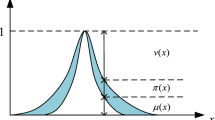Abstract
The regression method is widely used in predictive analysis. Its role is to derive an analytic estimation of the outputs expected for given inputs based on observed input-output data. The objective function that is optimized within the regression model is generally the representation of the approximation error comparing to the observed data. Nowadays, the uncertainty is commonly taken into consideration when modeling real systems, and vectorizing information is an important aspect of addressing big data in computer science. Consequently, finding pertinent fuzzy regression models is of great importance within mathematical modeling. In this paper we report our findings related to the full use of the extension principle in solving the optimization model comprised in a least square fuzzy linear regression methodology. We propose a solution approach based on mathematical programming to estimate the fuzzy outputs of the observed fuzzy data; and group our experiments in two categories with respect to the crispness of the observed input data. The first category uses crisp input data and is considered to better explain the advantage of using the extension principle within the solution approach; while the second category, having fuzzy both input and output observed data, is included to prove the relevance of the new approach compared to methodologies from the recent literature.
Access this chapter
Tax calculation will be finalised at checkout
Purchases are for personal use only
Similar content being viewed by others
References
Chen, L.H., Nien, S.H.: A new approach to formulate fuzzy regression models. Appl. Soft Comput. 86, 105915 (2020)
Chukhrova, N., Johannssen, A.: Fuzzy regression analysis: systematic review and bibliography. Appl. Soft Comput. 84, 105708 (2019)
He, Y., Wang, X., Huang, J.Z.: Fuzzy nonlinear regression analysis using a random weight network. Inf. Sci. 364–365, 222–240 (2016)
Hojati, M., Bector, C.R., Smimou, K.: A simple method for computation of fuzzy linear regression. Eur. J. Oper. Res. 166(1), 172–184 (2005). Metaheuristics and Worst-Case Guarantee Algorithms: Relations, Provable Properties and Applications
Kashani, M., Arashi, M., Rabiei, M.R., D’Urso, P., De Giovanni, L.: A fuzzy penalized regression model with variable selection. Expert Syst. Appl. 175, 114696 (2021)
Kim, B., Bishu, R.R.: Evaluation of fuzzy linear regression models by comparing membership functions. Fuzzy Sets Syst. 100(1), 343–352 (1998)
Chen, L.H., Hsueh, C.C.: A mathematical programming method for formulating a fuzzy regression model based on distance criterion. IEEE Trans. Syst. Man Cybern. B Cybern. 37(3), 705–12 (2007)
Nasrabadi, M.M., Nasrabadi, E.: A mathematical-programming approach to fuzzy linear regression analysis. Appl. Math. Comput. 155(3), 873–881 (2004)
Savic, D.A., Pedrycz, W.: Evaluation of fuzzy linear regression models. Fuzzy Sets Syst. 39(1), 51–63 (1991)
Skrabanek, P., Marek, J., Pozdilkova, A.: Boscovich fuzzy regression line. Mathematics 9(6), 685 (2021)
Stanojevic, B., Stanojevic, M., Nadaban, S.: Reinstatement of the extension principle in approaching mathematical programming with fuzzy numbers. Mathematics 9(11), 1272 (2021)
Tanaka, H., Uejima, S., Asai, K.: Linear regression analysis with fuzzy model. IEEE Trans. Syst. Man Cybern. 12, 903–907 (1982)
Tanaka, H., Hayashi, I., Watada, J.: Possibilistic linear regression analysis for fuzzy data. Eur. J. Oper. Res. 40(3), 389–396 (1989)
Hsien-Chung, W.: Linear regression analysis for fuzzy input and output data using the extension principle. Comput. Math. Appl. 45(12), 1849–1859 (2003)
Zadeh, L.A.: Fuzzy sets. Inf. Control 8(3), 338–353 (1965)
Zadeh, L.A.: The concept of a linguistic variable and its application to approximate reasoning i. Inf. Sci. 8(3), 199–249 (1975)
Zeng, W., Feng, Q., Li, J.: Fuzzy least absolute linear regression. Appl. Soft Comput. 52, 1009–1019 (2017)
Acknowledgments
This work was supported by the Serbian Ministry of Edu-cation, Science and Technological Development through Mathematical Instituteof the Serbian Academy of Sciences and Arts and Faculty of Organizational Sciences of the University of Belgrade.
Author information
Authors and Affiliations
Corresponding author
Editor information
Editors and Affiliations
Rights and permissions
Copyright information
© 2023 The Author(s), under exclusive license to Springer Nature Switzerland AG
About this paper
Cite this paper
Stanojević, B., Stanojević, M. (2023). Extension-Principle-Based Approach to Least Square Fuzzy Linear Regression. In: Dzitac, S., Dzitac, D., Filip, F.G., Kacprzyk, J., Manolescu, MJ., Oros, H. (eds) Intelligent Methods Systems and Applications in Computing, Communications and Control. ICCCC 2022. Advances in Intelligent Systems and Computing, vol 1435. Springer, Cham. https://doi.org/10.1007/978-3-031-16684-6_18
Download citation
DOI: https://doi.org/10.1007/978-3-031-16684-6_18
Published:
Publisher Name: Springer, Cham
Print ISBN: 978-3-031-16683-9
Online ISBN: 978-3-031-16684-6
eBook Packages: Intelligent Technologies and RoboticsIntelligent Technologies and Robotics (R0)




